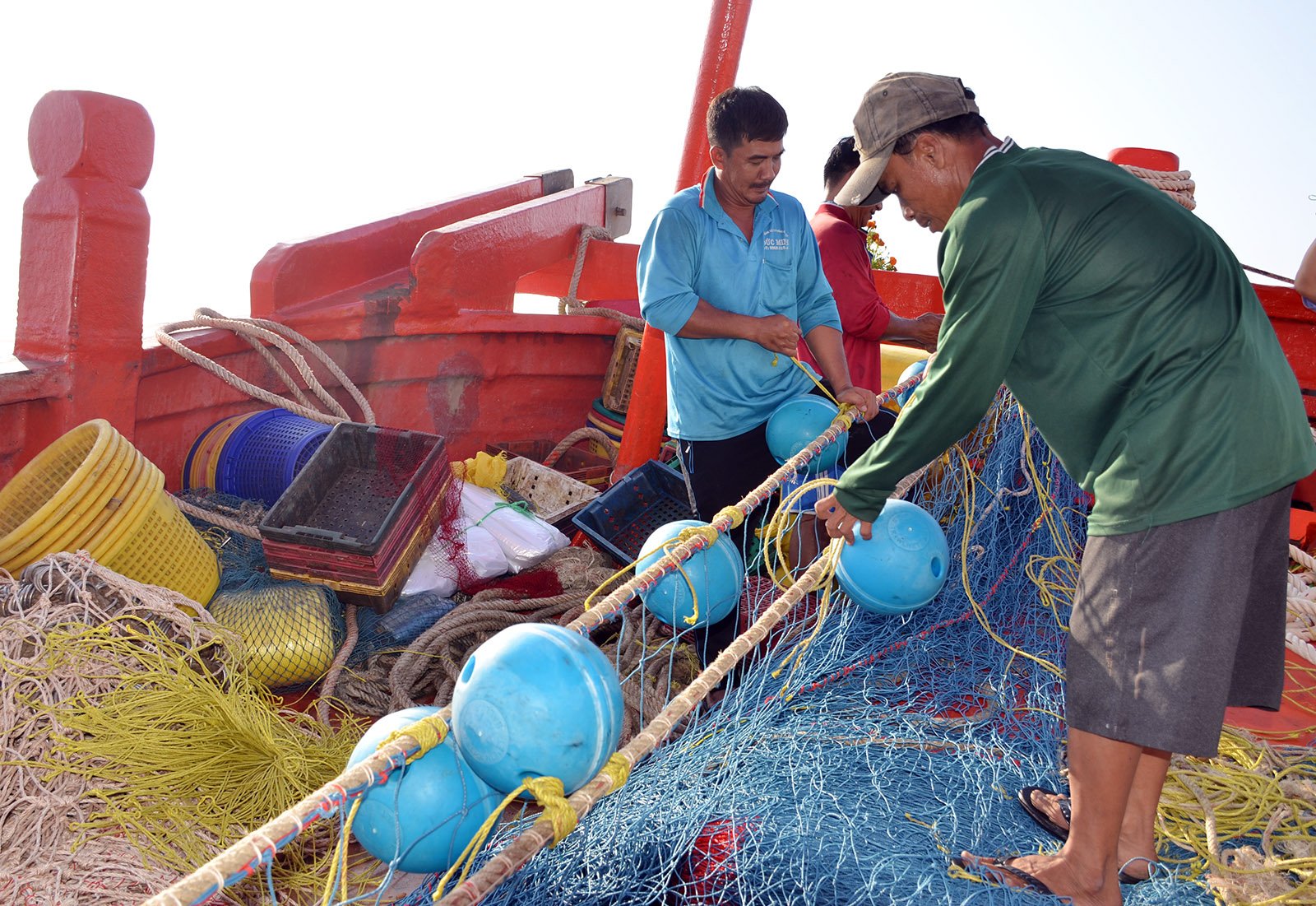Many difficulties
At Van Thanh sluice gate in Hon Dat commune, more than 100 fishing boats enter, leave, and anchor daily. Most fishermen are from disadvantaged economic backgrounds, possess small fishing vessels, and primarily earn their living through trawling, bottom trawling, and other fishing methods such as seine nets, traps, and gillnets in the nearshore waters.
Mr. Nguyen Van Chin, a fisherman from Van Thanh hamlet, said: “Compared to previous years, there are far fewer fish and shrimp in the coastal waters. Before, I could earn 2-3 million dong per trip, and after deducting fuel and food costs, I still made a profit of about half. Now, when I go out to sea, I just hope to earn enough to cover the fuel costs. My family doesn't own any land, and we don't have the capital to change professions.”
Fishermen with offshore fishing vessels also face numerous difficulties and challenges because fishing is no longer economically viable. Many boat owners suffer losses and have to keep their boats idle.
According to Mr. Truong Van Ngu, Chairman of the Rach Gia Ward Fisheries Association, most boat owners have mortgaged their assets to borrow money from banks in order to have capital to go out to sea. A fishing trip lasting 2-3 months requires the boat owner to spend 1.8-2 billion VND on fuel, ice, advance wages for fishermen, food, and supplies. Fishing grounds are increasingly depleted, making going out to sea like a gamble. If lucky, the boat owner might break even or make a profit of a few tens of millions of VND. If unlucky, the fish catch is small, and neither the boat owner nor the crew will have money; the boat owner may even have to cover the costs of depreciation, repairs, and bank loan interest.
Fishermen participate in fishing activities in the waters of Nam Du, Kien Hai Special Economic Zone.
When the fishing grounds in the province no longer yield abundant seafood resources, many fishing vessels and fishermen have resorted to illegally exploiting marine resources in foreign waters. The situation regarding violations of IUU (Illegal, Unreported, and Unregulated) fishing regulations in the province has become extremely complex recently, with many individuals colluding to send vessels to illegally fish in the waters of Malaysia and Indonesia, resulting in arrests, prosecutions, and trials by authorities.
As of July 2025, An Giang province had 5 cases involving 6 fishing vessels violating foreign waters, resulting in their seizure and processing. This is one of the biggest shortcomings and limitations of the province in implementing solutions to lift the European Commission's "yellow card."
Reorganize occupations
According to Le Huu Toan, Director of the Department of Agriculture and Rural Development: “With aquatic resources becoming increasingly depleted, the province is implementing a restructuring of the fisheries sector, shifting from exploitation to aquaculture to ensure a balance between exploitation and aquaculture; gradually reducing the number of fishing vessels to lessen fishing intensity; creating jobs and increasing income for coastal communities.”
Following the roadmap from 2021 to the present, the province has reduced the number of fishing vessels by 1,660. The majority are fishing vessels with a maximum length of less than 12m operating in coastal areas, and notably, 286 vessels engaged in trawling and gillnet fishing for tuna with a maximum length of 15m or more operating in offshore areas have been eliminated.
At the same time, 37 fishing vessels engaged in trawling and gillnet fishing (a prohibited activity) will be converted to fishing methods encouraged for development (trapping, longline fishing, purse seine fishing, and logistics services for fishing). The province aims to reduce the total number of fishing vessels to 8,625 by 2030.
According to the Department of Agriculture and Environment, the province is focusing on restoring and regenerating aquatic resources; and issuing mechanisms and policies to encourage businesses to invest in offshore aquaculture. It is evident that the province has been making efforts to implement more fundamental and effective solutions to restructure the fisheries sector, helping fishermen feel secure in their production.
Text and photos: THUY TRANG
Source: https://baoangiang.com.vn/tai-co-cau-nghe-bien-a425417.html











































































































Comment (0)